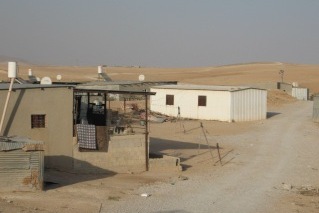
Update: On Sunday morning (20.07.2014), ACRI submitted an urgent request for the immediate provision of a judgment following the death of a Bedouin man near Dimona and the injury to his four family members.
In a High Court of Justice hearing this afternoon about the provision of protective facilities to Bedouin villages in the Negev, the state expressed its position that there is no need to provide additional protective facilities to these communities, and advised the Bedouin residents to protect themselves by lying on the ground. A ruling is expected in the coming days.
Earlier this afternoon, the High Court of Justice heard a petition by residents of Bedouin villages – including Omar Al Wakili from the village of Awajan, who is the uncle of Maram and Asil Wakili who were severely injured by falling rockets – in coordination with the Council of Unrecognized Villages in the Negev, Physicians for Human Rights – Israel, the Dukium Negev Coexistence Forum, Bimkom – Planners for Planning Rights and the Association for Civil Rights in Israel.
The petition was heard by Justices Yoram Danziger, Zvi Zylbertal and Noam Sohlberg.
ACRI Attorney Auni Banna who was representing the petitioners, explained at the hearing that the demand for portable bomb shelters is based on the urgency of finding a solution for 100,000 Bedouin residents who are living without any protective facilities.
State officials claimed that protecting the Bedouin villages was a low priority, and that the rate of rockets falling in the area is relatively low. Officials refused to answer the question of whether the Bedouin villages were within the range of the Iron Dome Interception System. In the State’s formal pleadings to the court, it claimed that the responsibility to provide protective facilities rests primarily on homeowners, but did not refer to the fact that most of the houses in these communities are simple shacks that are particularly vulnerable to damage and provide no protection. They also did not refer to the fact that the current legal situation forbids any construction in these communities and that any construction would be subject to a demolition order. The state officials insisted that the best protective measure that the residents could take was to lie on the ground.
In recent years, village residents and human rights organizations have turned repeatedly to the Ministry of Defence and the Home Front Command to provide protective facilities for these villages. Most of the letters were ignored. One of the responses provided to Physicians for Human Rights – Israel in 2009 explained that while advocacy activities were planned for village residents, there was no intention to provide any protective facilities to any Bedouin communities apart from Rahat.
According to ACRI Attorney Auni Banna: “State officials completely disregarded the fact that in villages where there are no shelters, no sirens, and where the houses are built mostly of aluminium – a falling rocket is exponentially more dangerous. The state’s conduct conveys a sense of how they distinguish one type of blood from another, and the abandonment of the Bedouin in the unrecognized villages.
Additional Materials
Additional background material on the hearing.
For ACRI’s updates tweeted live from the courtroom.







